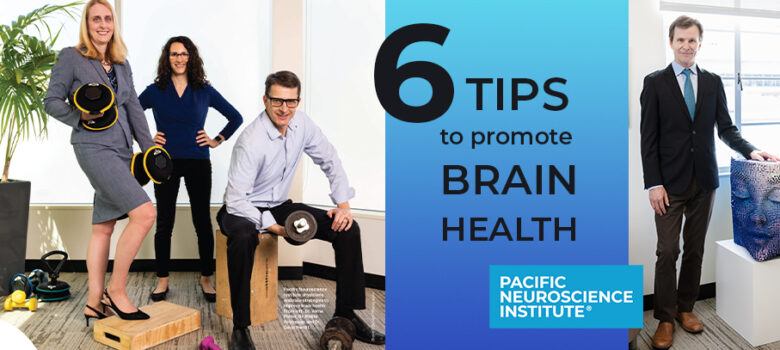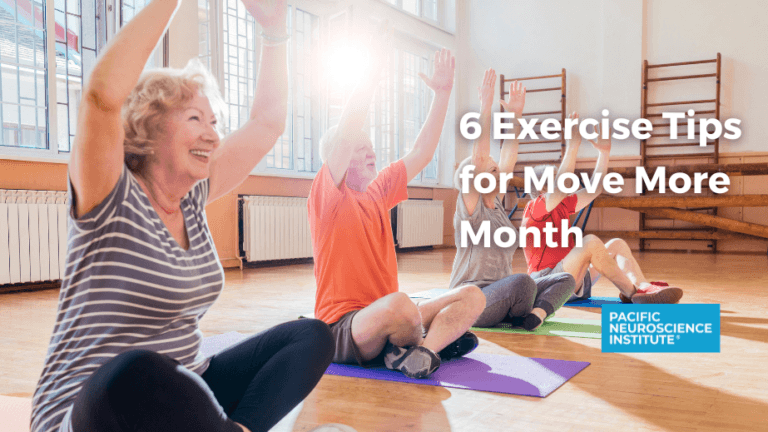

6 Tips to Promote Brain Health
by Guest Author
Strengthen your emotional and cognitive function with experts from Pacific Neuroscience Institute (PNI). Discover tips for incorporating exercise and nutrition into your daily routine to optimize your brain health.

David A. Merrill, MD, PhD.
At the Pacific Neuroscience Institute (PNI), our multidisciplinary team of specialists—including neurologists, psychiatrists, and psychologists— helps adults optimize brain health and slow cognitive decline. These brain experts use sophisticated testing and assessments to determine whether patients are experiencing normal aging or neurodegenerative disease. Our team then creates a plan of care combining medical interventions and lifestyle recommendations that can benefit people of all ages.
“Our brain health team looks at the big picture to give a package of recommendations for optimizing brain health and preventing cognitive decline,” says neurosurgeon Daniel F. Kelly, MD, PNI Director & Co-founder.
Dr. Kelly notes that while specific recommendations will be customized to an individual patient’s needs, there are six (6) pillars that all of us can use to promote brain health:
6 Pillars to Promote Brain Health
1. Exercise
Aim to be physically active for at least 30 minutes most days of the week.
2. Nutrition

Follow a healthy diet— such as the Mediterranean diet—high in plant-based foods including whole grains, vegetables, legumes, fruits, nuts, and seeds.
3. Cognitive stimulation
Engage in enjoyable activities that involve concentration and memory, such as reading, games, puzzles, and hobbies.
4. Mindfulness/meditation
Engage in mindfulness exercises.
5. Social stimulation
Seek out opportunities to interact with others. Nurture relationships with family and/ or friends.
6. Adequate sleep
Sleep needs vary by age. Most healthy adults require at least seven hours of sleep nightly.
Dr. Kelly says modifying your personal risk factors promotes brain health. This includes not smoking, decreasing alcohol consumption, lowering cholesterol levels, addressing hypertension, and losing excess weight with regular exercise. Following the six pillars helps achieve these goals.

“Diabetes, obesity, high cholesterol, hypertension, tobacco use, and excess alcohol consumption are all known risk factors for cognitive decline,” Dr. Kelly says.
Fortunately, much of this is within our power.
“While we can’t control our genetics, we can exert a huge amount of control over our health,” says Dr. Kelly. “It takes willpower, perseverance, and discipline, but, with help from your primary care provider, it is very doable.”
The impact of this effort pays off big as we enter our senior years, says David Merrill, MD, Director of the Pacific Brain Health Center.
“Optimizing your lifestyle supports healthy brain aging,” Dr. Merrill says. “We know that taking better care of ourselves as we age reduces the risk of developing age-related conditions like Alzheimer’s disease.”
How Our Neuroscientists Promote Their Own Brain Health
We asked several of our PNI physicians to share how they keep their own brains healthy and functioning at their best. Our team at the Brain Health Health Center works collaboratively to provide precision evaluation and holistic treatment for predominantly middle-aged and older adults.

Daniel Kelly, MD, PNI Director and Co-Founder
“I exercise most days, including running a couple of miles four to five times a week. I meditate for a short period just about every day. I do intermittent fasting about five days a week and don’t drink excessively. I also try to get seven hours of sleep each night, read a lot and listen to music. I have a good social environment at home with my family. All of these contribute to brain health.”

David Merrill, MD, Director, Pacific Brain Health Center
“My wife and I work out with a personal trainer three times a week. We do a combination of HIIT [high-intensity interval training] and functional exercises combining both aerobic and strength training. We started about six months into the pandemic and haven’t missed a session since. We’ve also optimized our diets by tracking what we eat.
We recently attended a Culinary Medicine CME conference called “Healthy Kitchens, Healthy Lives,” put on by the Culinary Institute of America and the Harvard School of Public Health. We received 300 healthy recipes that meet nutritional guidelines. We also prioritize time together as a couple. We have a weekly “date night” that prompts us to share our thoughts and feelings.”

Melita Petrossian, MD, Director, Pacific Movement Disorders Center
” I exercise two to three times per week, using a combination of high-intensity interval training, resistance training, and balance training. I try my best to follow a Mediterranean diet high in salads, vegetables, nuts, berries, fish, and poultry. I work on maintaining my sleep schedule as much as possible. The evidence shows that regular exercise and a Mediterranean diet can prevent dementia and other neurodegenerative diseases.”

Verna Porter, MD, Director of Programs for Dementia, Alzheimer’s Disease and Neurocognitive Disorders
“I exercise 5-6 nights a week for about 30 to 40 minutes on a treadmill and with weights for strength training. I also walk a few miles nightly with my dog. I focus on diet, nutrition, exercise, mental health, and well-being by consistently spending time with my family and friends. I also engage in religious/spiritual services through my local church. All these practices are important for maintaining cognitive, mental, emotional, and spiritual health and well-being.”
Related Links
- Pacific Brain Health Center – 310-582-7641
- Pacific Brain Health Center – Treatment & Conditions
- Lifestyle Program
Related Articles
Last updated: May 30th, 2023


